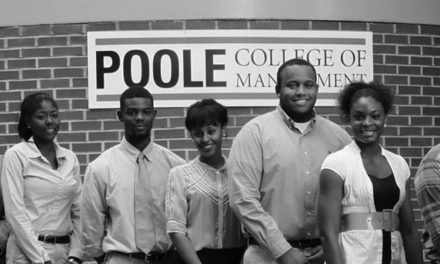Zoe Wilson | Correspondent
“Human progress is neither automatic nor inevitable… Every step toward the goal of justice requires sacrifice, suffering and the struggle; the tireless exertions and passionate concern of dedicated individuals,” originally said by Civil Rights Activist Martin Luther King Jr.
To kickoff the 25th anniversary of the African American Cultural Center and the MLK Jr. Campus Commemoration, ABC News anchor and Nightline co-host Byron Pitts spoke to a crowd of almost 600 on Monday, Jan. 11 about the difficulties he overcame in order to achieve a successful career in journalism.
“I liked how he spoke about his own personal adversity and made the presentation about his journey as a man,” said Mallory Deeter, a junior majoring in Communication with a concentration in public relations.

Kai McNeil | Staff Photographer
Pitts’ inspiring story proves that determination is key and that hard work pays off. His humble beginnings are rooted in Baltimore, MD. Raised by his single mother, Pitts faced significant financial, emotional and mental struggles. However, the “mustard seed” faith of his family as well as their ambitious nature provided him with a solid support system.
This is what gave Pitts the confidence he needed to make a distinguished career. “I have never been lucky a day in my life, but I have always been blessed,” he said.
It is hard to imagine someone so successful was declared mentally retarded by specialists at the age of twelve. At the time, he was failing almost all of his classes, and especially struggled with mathematics. After being brought in for testing, the doctors discovered that his difficulty in school stemmed from his inability to read. They recommended that he be institutionalized given the limited means and 10th grade education of his mother.
“I was surprised by his story. It was hard to believe that someone diagnosed as mentally retarded could speak that well,” said Darion Williams, a senior majoring in Construction Engineering and Management.
Despite the scarcity of resources available to him, the strenuous effort he devoted to his education allowed him to graduate high school. With hard work, Pitts went from being ranked number 435 out of 440 students in his class to number 40.
“I was not the best student in my high school, but I was the best student I could be,” he said.
Pitts was accepted into Ohio Wesleyan University in 1978 and graduated in 1982. While many college students think those four years are the best ones of their lives, he had a different experience.
“It was hard for me,” Pitts said. He was on academic probation for his first two years and at one point in time, he was seriously considering dropping out after an English professor told him that he was “not Wesleyan material.” Luckily, a kind first term professor was able to convince him otherwise.
While many doubted that he was capable of accomplishing such illustrious dreams, Pitts is now an Emmy award-winning journalist who has traveled the world to cover some of the biggest news stories of our time.
“He covered a lot, but my main take away was to have high aspirations for myself and set high goals. He encouraged me to create a list of goals and dreams to better myself and others. He also taught me that you don’t have to be a straight A students to be successful,” said Williams.
Pitts asked students to be as mindful and engaged as they possibly can. He encouraged them to take action and be involved in their community as well as the lives of those within it. Indifference is something that scares him because it impedes progress and change.
“Do not be indifferent about the opportunities you have to change the world. It might be as small as hug, but could change the world for someone else,” said Pitts.
While everyone in the crowd reacted well to his speech, giving him a standing ovation when he finished, some students were surprised by the content of his speech.
“I enjoyed listening to Pitt’s speech, however, it was not at all what I was expecting because of the current racial climate, I assumed he would address the challenges still facing the black community and thought he would start a dialogue on how to best bring about that change,” Deeter said.
While there is no simple fix for this problem our country has faced for decades, Pitts addressed the enormous progress that has been made. He appreciated was that unlike his great grandfather who was born a slave, he is a free man, able to live out the American dream.
“We are still a great nation, despite our flaws,” Pitts said. He emboldens each of us to both take advantage of and live up to that greatness.


